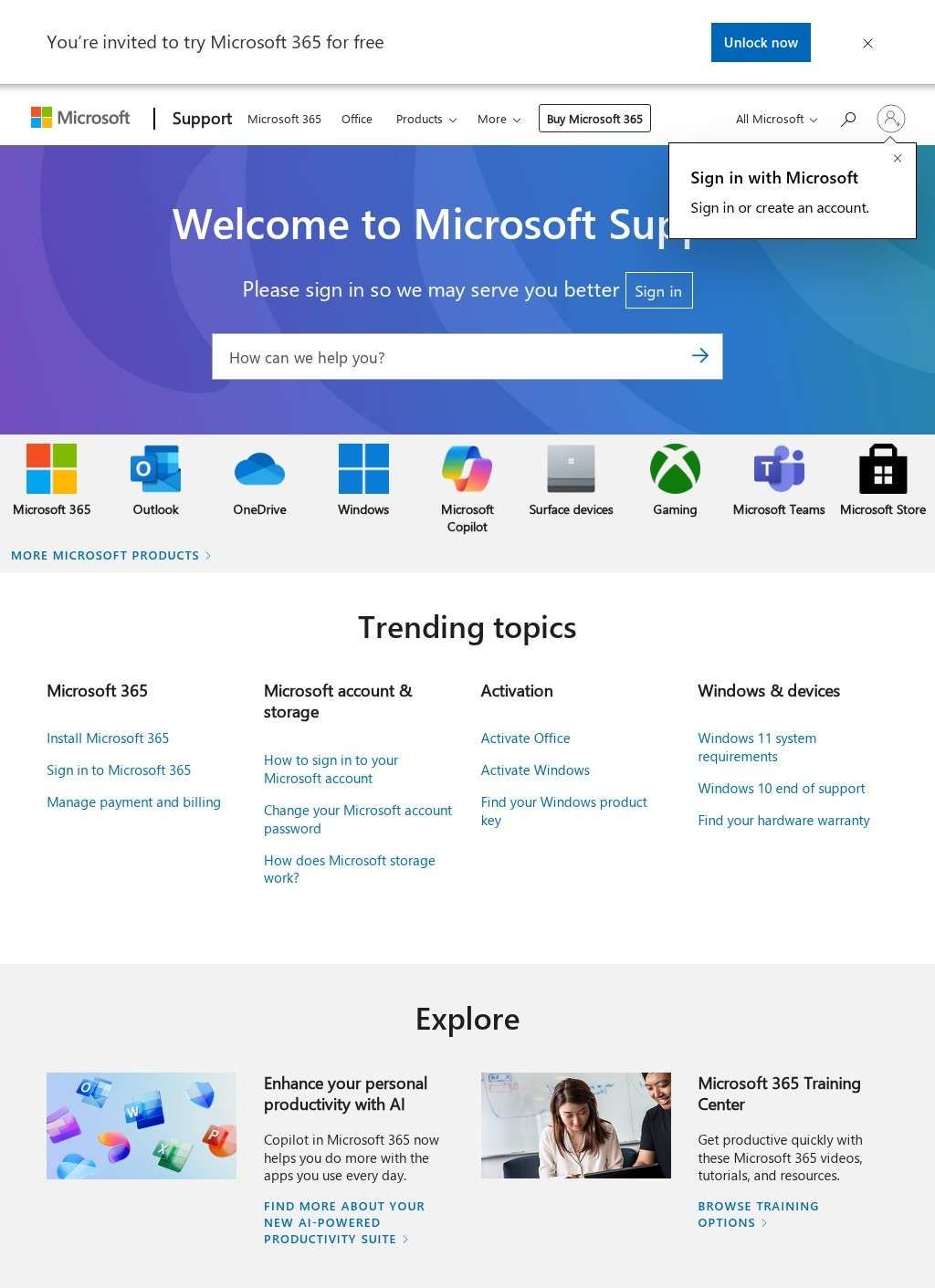Microsoft Support serves as the official gateway for technical assistance and maintenance support across Microsoft's vast ecosystem of software products and services. As one of the world's largest technology companies, Microsoft has developed a support infrastructure that spans everything from consumer-level Windows troubleshooting to enterprise-level Azure cloud service maintenance. The platform represents Microsoft's commitment to ensuring their software products continue functioning optimally throughout their lifecycle, making it an essential resource for both individual users and large organizations.
The platform's structure reflects Microsoft's diverse product portfolio, with specialized support sections for major product families including Microsoft 365, Windows operating systems, Surface hardware, Azure cloud services, and developer tools. Each product area maintains its own knowledge base, troubleshooting guides, and specialized support channels tailored to the specific needs and technical requirements of that product category. This specialization ensures that users receive targeted assistance rather than generic support that might not address their specific software maintenance needs.
Microsoft's approach to software maintenance support has evolved significantly with their shift toward cloud-based services and subscription models. For Microsoft 365 subscribers, the support platform provides ongoing assistance with software updates, feature changes, security patches, and integration issues. The platform includes extensive training resources designed to help users and administrators stay current with evolving features and capabilities, which is particularly important given Microsoft's rapid development cycle for cloud-based applications.
One of the platform's strengths is its multi-tiered support structure that accommodates different user types and organizational needs. Individual consumers can access free support resources including extensive knowledge bases, community forums, and automated troubleshooting tools. Business and enterprise customers have access to additional support channels including phone support, priority case handling, and dedicated account management for large organizations. This tiered approach ensures that organizations can scale their support relationship with Microsoft based on their specific needs and technical complexity.
The Microsoft Support platform places significant emphasis on self-service resources, recognizing that many software maintenance issues can be resolved through proper documentation and guided troubleshooting. The knowledge base includes thousands of articles covering common maintenance scenarios, step-by-step troubleshooting procedures, and detailed documentation about software updates and feature changes. These resources are regularly updated to reflect the latest software versions and emerging issues, making the platform a valuable resource for organizations managing their own software maintenance processes.
For enterprise customers, Microsoft Support integrates closely with their Software Assurance programs and Premier Support offerings. These services provide enhanced maintenance support including proactive health checks, personalized support account management, and access to specialized technical experts for complex software issues. The platform also connects to Microsoft's Professional Services organization, which can provide hands-on assistance with software deployments, migrations, and major maintenance projects that require specialized expertise.
Microsoft's community-driven support model represents another significant aspect of their maintenance platform. The Microsoft Community forums allow users to share solutions, discuss common maintenance challenges, and learn from others' experiences with Microsoft software. This community approach is particularly valuable for organizations dealing with less common software configurations or integration scenarios where traditional documentation might not provide complete solutions. Microsoft employees actively participate in these communities, providing official guidance and escalating issues when necessary.
The platform's integration with Microsoft's lifecycle management policies provides valuable planning information for organizations managing software maintenance budgets and upgrade schedules. Microsoft publishes detailed lifecycle information for all their products, including support timelines, required updates, and end-of-life dates. This information is accessible through the support platform and helps organizations plan their software maintenance strategies well in advance of major transitions or required upgrades.
Microsoft Support includes specialized resources for different deployment scenarios, recognizing that software maintenance requirements vary significantly between cloud-based, on-premises, and hybrid environments. The platform provides specific guidance for each deployment model, including maintenance procedures for complex enterprise environments with multiple software integration points. This specialization is particularly valuable for organizations running mixed environments or planning migrations between different deployment models.
The platform's mobile and accessibility features ensure that support resources remain available across different devices and user needs. Microsoft has invested significantly in making their support platform accessible to users with disabilities, and the mobile-optimized interface allows administrators to access support resources and submit support cases from anywhere. This accessibility is particularly important for organizations with distributed IT teams or administrators who need to respond to software maintenance issues outside of traditional office environments.
Organizations can access Microsoft Support through multiple channels including the web-based portal, dedicated phone lines for different product categories, and integration with Microsoft's partner network for indirect support relationships. The platform maintains comprehensive contact information for different support tiers and provides clear guidance about when to use each support channel. For organizations with complex support needs, Microsoft offers consultation services to help design appropriate support strategies that align with specific organizational requirements and software maintenance objectives.
